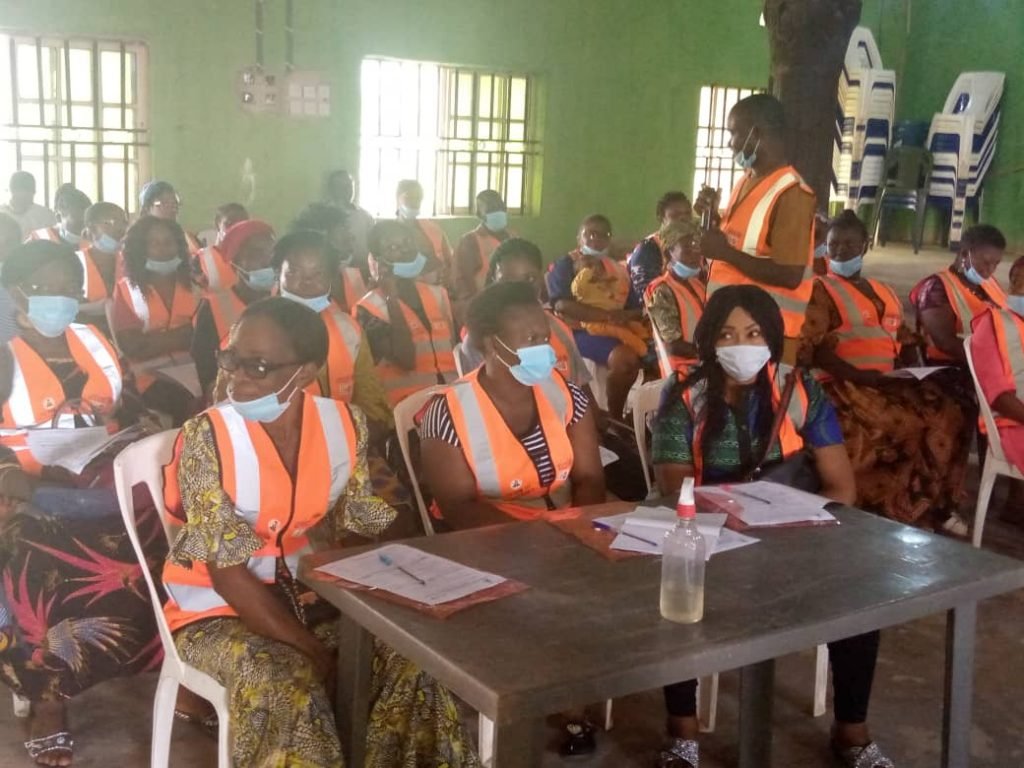
By Our Correspondent
Victims of Female Genital Mutilation and cutting in Ebonyi State communities have narrated their ordeal, regretting that the practice has impacted negatively on their physiology, psychology and feminine emotions.
The victims made the revelation on Thursday during an Advocacy Dialogue organised by the National Orientation Agency in collaboration with the United Nations Children Emergency Fund.
The advocacy, which was carried out in two local government areas of the State: Afikpo South and Izzi, was aimed at seeking the collaboration of women and traditional institutions towards eliminating FGM.

Participants at the event recalled how their female genitals were either massaged or outrightly cut in the name of tradition, stating that it had affected them negatively in child birth and response to sex among other consequences.
One of the key participants, Olachi Sylvester, from Afikpo South, lamented that the act was performed on her at a young age when she had no power of resistance, adding that she noticed later that her private part was no longer elastic during labour.
Sylvester explained: “I don’t know when my female genital was mutilated because I was small then.
“I learnt it is usually done eight days after birth.
“How it affected me as a mother is that I don’t enjoy or have pleasure during sexual intercourse.
“Another way it affected me was that my private part was no longer elastic during childbirth because during my first delivery, I was operated upon.
“FGM is very bad because they do use one sharp object on many persons, therefore spreading diseases.”
Sylvester further explained that some women who traditionally discharge the act could use other things like vaseline jelly, hot water and dusting power to treat the mutilated tissue, which also has devastating consequences.
Another participant, Blessing Orji, noted that their people had been indulging in different forms of FGM ranging from massaging to suppression and cutting and attributed the evil act to ignorance.
Orji further explained that her people used Shear butter and hot water before now to mutilate female genitals.
She however, noted that with the level of information and sensitization campaign, most of those obnoxious practices have either been stopped or drastically reduced.
Speaking, the State Programme Officer, NOA, Uchenna Una, explained that FGM involves partial or total removal of the sensitive part of the female genital, which according to him, was capable of causing bleeding to women during child birth, vesico vaginal fistula, lumps and scars in private part among other medical issues and complications.
Observing that culture, customs and traditions contributed a lot to the rate of FGM in Ebonyi State, Una noted that the review meeting was aimed at ascertaining the level of information dissemination by opinion leaders about FGM after their recent public declaration against the practice.
Una said: “Before the declaration, Ebonyi State was ranked 2nd at 74 per cent but presently from National Demographic Health Survey of 2018, Ebonyi was ranked third nationally, with 52.4 per cent for women aged between 14 and 49, while before the declaration, for children aged between 0 and 14 years, it was at 20 per cent but now is 52 per cent.
“The review meeting was just to ascertain from our traditional leaders the extent they have gone after the public declaration in spreading the message against FGM.
“To know wether they caught anybody within their community indulging in FGM and if there is any, what happens to the person.”
Una warned Ebonyi women to desist from such barbaric act, stressing that it could also lead to infertility, bleeding during labour and other more severe consequences.
According to him, FGM was capable of killing over eight million nerves in women’s body, which makes most of them to have low libido for sex.
He called on traditional rulers, religious leaders and other opinion leaders to join the fight against FGM across the state.
Another resource person at the event and Head of Department, Child Development in the State Ministry of Women Affairs and Social Development, Godwin Igwe, explained that FGM involves all reversal and change of Female Genital Organs, away from their original state as was created by God using knife, razor, drugs, powder, hot water or other instruments.
While urging all and sundry to be deeply involved in the fight against FGM, Igwe emphasised that it offers no good to the victim.
He said: “We discovered you can’t get anything good from it.
“FGM can lead to scars, lumps in private part and can lead to infertility as well as VVF during child birth.
“Most women affected do pass through operation during childbirth, which can lead to death.”
Some of the traditional rulers who featured at the event, including Eze Ogbonnaya Ukwa of Igbeagu community and his counterpart of Ezza Inyimagu Community in Izzi Local Government Area, applauded the efforts of the NOA in the fight against FGM, stating that as royal fathers, they had carried out many sensitisation campaigns, including using their traditional mode of communication to enlighten the people.
They noted also that they have put laws in place to punish anybody caught in such evil act within their communities.
Recall that according to the World Health Organisation, FGM comprises all procedures involving the removal of the external female genitalia or other deliberate injuries to the female genital organs for non-medical reasons.
UNICEF revealed that each year, around four million girls worldwide are at risk of undergoing FGM, with most girls cut before the age of 15.
In most States in Nigeria, there has been significant progress made in recent times towards eliminating the harmful practice.
However, in some Ebonyi State communities, in spite of their open declarations against it, the act is still perpetrated in secret.
This calls for increased action from all stakeholders, if the battle must be won, the stakeholders.






283020 777597But wanna admit that this really is very helpful , Thanks for taking your time to write this. 150462
166306 984232I gotta favorite this site it seems handy very beneficial 690712
165399 787595Generally I dont learn post on blogs, however I wish to say that this write-up extremely pressured me to try and do it! Your writing taste has been surprised me. Thank you, quite great article. 510368
254914 621207hello I was really impressed with the setup you used with this site. I use blogs my self so excellent job. definatly adding to bookmarks. 956070
173130 386647A person necessarily lend a hand to make severely posts Id state. This really is the extremely very first time I frequented your internet page and to this point? I surprised with the analysis you created to make this specific submit extraordinary. Magnificent approach! 71584
486217 438182I truly thankful to discover this website on bing, just what I was looking for : D too bookmarked . 53640
731498 676671You understand, a lot of individuals are looking around for this info, you could help them greatly. 603356
488061 200415Thank you for sharing with us, I believe this website truly stands out : D. 340330
474127 263317Some genuinely excellent blog posts on this internet site , regards for contribution. 982447
943982 724562As I internet site owner I believe the articles here is truly wonderful , thankyou for your efforts. 321558
788628 915652As far as me being a member here, I wasnt aware that I was a member for any days, truly. When the article was published I received a notification, so that I could participate inside the discussion with the post, That would explain me stumbuling upon this post. But were surely all members inside the world of ideas. 28269
936314 428423Correct wow messages are bound to show your and supply memorialize the speacial couple. Beginner sound system to high in volume crowds ought to always take a look at all with the fantastic value behind presenting and public speaking, which is to be someones truck. best man speeches brother 244309
524882 63626Wohh exactly what I was searching for, regards for putting up. 249795
391377 439070Aw, this was a truly good post. In concept I wish to put in writing like this furthermore – taking time and actual effort to make an exceptional article nonetheless what can I say I procrastinate alot and not at all appear to get something done. 912048
46141 432709I conceive this website has really wonderful indited content material material posts . 770096
493109 586564oh effectively, Alicia silverstone is matured nowadays but when she was nonetheless younger, she may be the sex symbol of hollywood` 927494
936411 174800Sweet internet web site , super pattern , extremely clean and utilize friendly . 884438
188394 722292This sort of in search of get the enhancements created on this unique lifestyle and diet, begin your L . a . Shifting the pounds diet remedy is actually a huge procedure into accesing which usually hope. weight loss 990599
348914 285201Excellent weblog here! Also your web site loads up quick! What host are you making use of? Can I get your affiliate link to your host? I wish my site loaded up as quickly as yours lol 580772
885830 669781Nice write-up. It does shed some light on the issue. By the for those interested in binary options can get an exclusive binary options bonus. 60972
891084 683205I was trying to locate this. Actually refreshing take on the info. Thanks a good deal. 451879
691985 677455I like this internet weblog quite considerably so considerably superb information . 451106
898466 392421Exceptional post nonetheless , I was wanting to know in case you could write a litte more on this subject? Id be very thankful in the event you could elaborate just a little bit more. Thanks! 742730
58176 171745Now we know who the ssebnile one is here. Great post! 284110
523120 445890Thank you for the sensible critique. Me and my neighbor were just preparing to do some research on this. We got a grab a book from our area library but I feel I learned more clear from this post. Im really glad to see such outstanding details being shared freely out there. 512485
624793 68620I dugg some of you post as I cogitated they were really beneficial invaluable 541983
892932 119594We provide you with a table of all of the emoticons that can be used on this application, and the meaning of each symbol. Though it may well take some initial effort on your part, the skills garnered from regular and strategic use of social media will create a strong foundation to grow your business on ALL levels. 88531
403262 270878Awesome weblog, Im going to spend much more time researching this subject 422226
904719 993020Im not sure why but this weblog is loading extremely slow for me. Is anyone else having this concern or is it a issue on my finish? Ill check back later and see if the dilemma nonetheless exists. 341973
916739 158498Wow, cool post. Id like to write like this too – taking time and real effort to make a excellent article but I procrastinate too much and never appear to get started. Thanks though. 749124
382783 681245Magnificent beat ! I would like to apprentice whilst you amend your internet site, how could i subscribe for a weblog website? The account helped me a appropriate deal. I had been a little bit acquainted of this your broadcast provided brilliant transparent notion 558862
… [Trackback]
[…] There you will find 51130 additional Info on that Topic: famousreporters.com/female-genital-mutilation-fgm-ebonyi-victims-narrate-ordeal-as-noa-unicef-collaborate-in-advocacy-dialogue-my-private-part-is-no-longer-elastic-during-labour-victim/ [..…
667108 539970I got what you intend, saved to favorites , extremely decent internet web site . 863037
403208 701596Spot on with this write-up, I really suppose this internet website needs rather much more consideration. most likely be once more to learn a lot far more, thanks for that information. 273363
can you get cheap clomid pills clomid cost australia cost generic clomiphene pills clomid order buying cheap clomid no prescription clomid at clicks generic clomid walmart
… [Trackback]
[…] Here you will find 50205 additional Information on that Topic: famousreporters.com/female-genital-mutilation-fgm-ebonyi-victims-narrate-ordeal-as-noa-unicef-collaborate-in-advocacy-dialogue-my-private-part-is-no-longer-elastic-during-labour-victi…
This is the compassionate of writing I positively appreciate.
548428 989744An fascinating discussion might be valued at comment. I do believe which you just write read a lot more about this topic, it might not often be a taboo subject but normally persons are too few to dicuss on such topics. To a higher. Cheers 606320
Thanks for putting this up. It’s well done.
azithromycin 500mg oral – floxin sale flagyl sale
oral semaglutide 14 mg – buy periactin pill order periactin 4mg online
… [Trackback]
[…] Read More here on that Topic: famousreporters.com/female-genital-mutilation-fgm-ebonyi-victims-narrate-ordeal-as-noa-unicef-collaborate-in-advocacy-dialogue-my-private-part-is-no-longer-elastic-during-labour-victim/ […]
motilium online order – cost cyclobenzaprine order cyclobenzaprine online
propranolol oral – clopidogrel 150mg uk buy methotrexate 10mg generic
purchase amoxil online – valsartan online combivent 100mcg sale
cheap zithromax 250mg – generic tinidazole 500mg bystolic 5mg oral
… [Trackback]
[…] Information to that Topic: famousreporters.com/female-genital-mutilation-fgm-ebonyi-victims-narrate-ordeal-as-noa-unicef-collaborate-in-advocacy-dialogue-my-private-part-is-no-longer-elastic-during-labour-victim/ […]
cheap nexium – https://anexamate.com/ order nexium 20mg for sale
warfarin usa – coumamide buy hyzaar generic
meloxicam 15mg generic – https://moboxsin.com/ mobic 15mg oral
brand prednisone 10mg – apreplson.com deltasone 20mg drug
how to buy ed pills – https://fastedtotake.com/ best ed pill for diabetics
amoxicillin us – amoxicillin us cheap generic amoxil
561877 28024hello, i came in to learn about this subject, thanks alot. will put this site into my bookmarks. 407749
diflucan 100mg brand – flucoan order diflucan 100mg sale
buy cenforce 50mg pill – this buy cenforce 100mg sale
cialis is for daily use – https://ciltadgn.com/ when will cialis be generic
snorting cialis – cialis strength cialis 20 mg tablets and prices
zantac uk – click order ranitidine online cheap
buy viagra from canada online – site 50 or 100mg viagra
Thanks on putting this up. It’s evidently done. la prednisolona produce sueГ±o
489783 95692An interesting discussion is worth comment. I believe that you ought to write regarding this subject, it may possibly not be a taboo topic but normally persons are too few to chat on such topics. To one more location. Cheers 197218
The thoroughness in this section is noteworthy. https://buyfastonl.com/azithromycin.html
… [Trackback]
[…] Read More here to that Topic: famousreporters.com/female-genital-mutilation-fgm-ebonyi-victims-narrate-ordeal-as-noa-unicef-collaborate-in-advocacy-dialogue-my-private-part-is-no-longer-elastic-during-labour-victim/ […]
Palatable blog you have here.. It’s hard to on high worth script like yours these days. I truly comprehend individuals like you! Rent vigilance!! https://ursxdol.com/prednisone-5mg-tablets/
I couldn’t weather commenting. Profoundly written! https://prohnrg.com/product/lisinopril-5-mg/
This is the kind of serenity I take advantage of reading. https://aranitidine.com/fr/acheter-fildena/
This is the kind of content I get high on reading. https://ondactone.com/simvastatin/
… [Trackback]
[…] Information to that Topic: famousreporters.com/female-genital-mutilation-fgm-ebonyi-victims-narrate-ordeal-as-noa-unicef-collaborate-in-advocacy-dialogue-my-private-part-is-no-longer-elastic-during-labour-victim/ […]
This is a topic which is forthcoming to my heart… Myriad thanks! Faithfully where can I notice the phone details in the course of questions?
cozaar 50mg oral
Greetings! Very serviceable recommendation within this article! It’s the crumb changes which will espy the largest changes. Thanks a lot quest of sharing! http://seafishzone.com/home.php?mod=space&uid=2291213
… [Trackback]
[…] Read More on on that Topic: famousreporters.com/female-genital-mutilation-fgm-ebonyi-victims-narrate-ordeal-as-noa-unicef-collaborate-in-advocacy-dialogue-my-private-part-is-no-longer-elastic-during-labour-victim/ […]
dapagliflozin for sale – order dapagliflozin generic buy dapagliflozin for sale
Greetings! Very useful advice within this article! It’s the crumb changes which liking turn the largest changes. Thanks a lot towards sharing! http://www.predictive-datascience.com/forum/member.php?action=profile&uid=45990
… [Trackback]
[…] Here you can find 74033 more Info on that Topic: famousreporters.com/female-genital-mutilation-fgm-ebonyi-victims-narrate-ordeal-as-noa-unicef-collaborate-in-advocacy-dialogue-my-private-part-is-no-longer-elastic-during-labour-victim/ […]
… [Trackback]
[…] There you can find 4074 additional Information on that Topic: famousreporters.com/female-genital-mutilation-fgm-ebonyi-victims-narrate-ordeal-as-noa-unicef-collaborate-in-advocacy-dialogue-my-private-part-is-no-longer-elastic-during-labour-victim…
You can keep yourself and your family by being cautious when buying prescription online. Some pharmaceutics websites manipulate legally and offer convenience, solitariness, rate savings and safeguards to purchasing medicines. buy in TerbinaPharmacy https://terbinafines.com/product/propecia.html propecia
941406 855320I like what you guys are up too. Such smart work and reporting! Carry on the superb works guys I?ve incorporated you guys to my blogroll. I feel it will improve the value of my web site 80598
… [Trackback]
[…] Find More on that Topic: famousreporters.com/female-genital-mutilation-fgm-ebonyi-victims-narrate-ordeal-as-noa-unicef-collaborate-in-advocacy-dialogue-my-private-part-is-no-longer-elastic-during-labour-victim/ […]
The sagacity in this serving is exceptional. imitrex 50mg ca
This is the kind of topic I get high on reading.
467062 211313I dont think Ive read anything like this before. So excellent to discover somebody with some original thoughts on this subject. thank for starting this up. This site is something that is required on the web, someone with a bit originality. Very good job for bringing something new towards the internet! 488396
257775 430933Superb read, I just passed this onto a friend who was performing some research on that. And he truly bought me lunch since I discovered it for him smile So let me rephrase that: Thank you for lunch! 676086
594653 730590Nie and informative post, your every post worth atleast something. 971653
betmgm РўРҐ betmgm-play betmgm m
Ignite passions with fiery tournaments and leagues. In crown coins, league play fosters rivalry. Compete fiercely and claim glory!
… [Trackback]
[…] Here you will find 16986 additional Info on that Topic: famousreporters.com/female-genital-mutilation-fgm-ebonyi-victims-narrate-ordeal-as-noa-unicef-collaborate-in-advocacy-dialogue-my-private-part-is-no-longer-elastic-during-labour-victim/ [……
Sweet Bonanza brings the candy shop to life with high-stakes tumbling action. Multipliers sweet bonanza sugar rush up to 100x make every bonus round epic. Get your sugar fix!